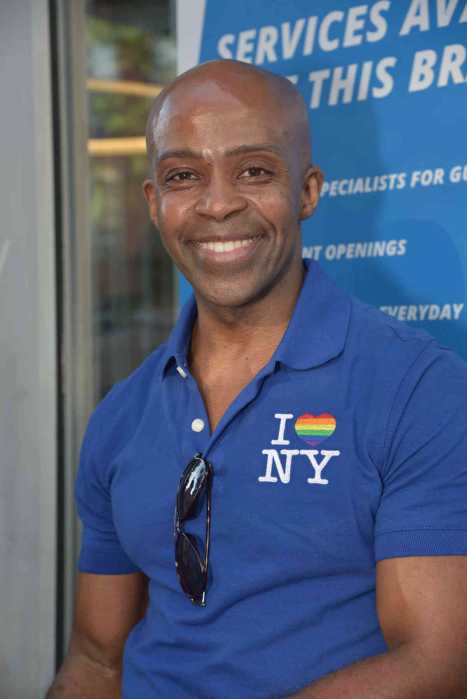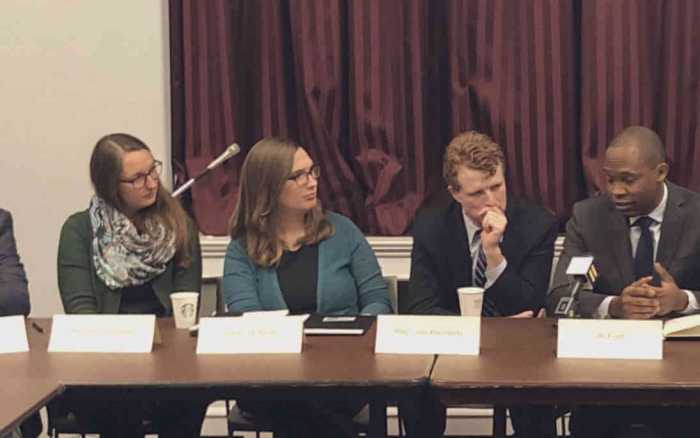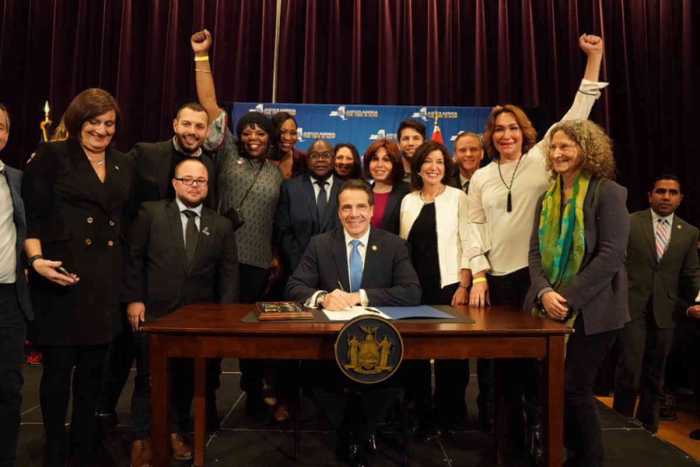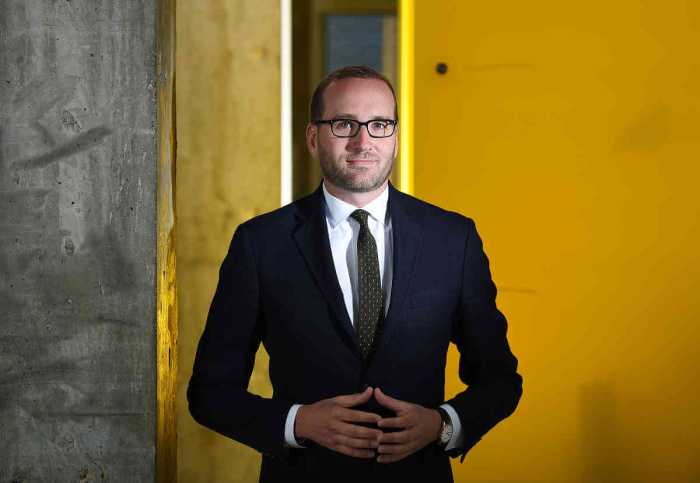HRC president Chad Griffin addresses the Waldorf audience. | MICHAEL SHIREY
In a carefully and tightly framed speech at the Human Rights Campaign’s annual New York City gala, Chad Griffin, the group’s president, laid out an agenda for the LGBT community “beyond marriage.”
Griffin, in his January 31 address to a large crowd that filled the ballroom and balconies of Midtown’s Waldorf Astoria Hotel, said that even if the Supreme Court affirms a constitutional right to marry for same-sex couples this year, “you could get married at 10 a.m. and be fired or evicted by 2” based on a Facebook post of a wedding picture.
“There is no comprehensive anti-discrimination law in the United States,” he said. “It’s never been passed.”
Chad Griffin says comprehensive anti-bias bill set for “this session,” as group faces protest outside
For the first time since the late New York Congressmembers Bella Abzug and Ed Koch introduced legislation to add sexual orientation as a protected class under the 1964 Civil Rights Act, Griffin said, a “comprehensive” nondiscrimination act offering protections not only in employment, but also housing, public accommodations, credit access, and other areas would be introduced “in this session” of Congress — with both sexual orientation and gender identity covered. “Full equality, nothing more, nothing less,” is HRC’s goal, he said.
“We must pass this bill,” Griffin told the crowd, though the prospects for movement in a Republican-controlled Congress that has never even come to agreement on employment protections are slim, at the very best.
The shift to a comprehensive measure, as opposed to the narrower focus on the Employment Non-Discrimination Act that HRC has struggled to see enacted for more than two decades, comes in response to widespread criticism within the LGBT community that ENDA was only a half measure.
Protesters outside the HRC gala at the Waldorf Astoria. | MICHAEL SHIREY
Griffin did not address the thorny question of whether HRC and other advocates could successfully jettison the religious exemption provision in ENDA that some critics said provided “a license to discriminate.” Nor did he say whether the new push would borrow from the Abzug/ Koch approach of amending the 1964 Act. The broader civil rights advocacy community, though supportive of LGBT nondiscrimination protections, has not yet embraced the idea of reopening the Civil Rights Act at a time when longstanding protections could face right wing criticism.
According to Fred Sainz, HRC’s lead spokesperson, “We are looking at all options for structuring the legislation.”
To be sure, despite emphasizing the group’s priorities “beyond marriage,” Griffin was not taking a Supreme Court victory in appeals of the Sixth Circuit’s reversal of marriage equality decisions in Ohio, Michigan, Tennessee, and Kentucky for granted. The community’s day at the high court, he said, represents “a crucial victory that we must win.”
The challenge HRC faces in pivoting to a comprehensive nondiscrimination push was reflected in brief comments that New York Senator Chuck Schumer made early in the evening.
“We’re going to pass ENDA,” he said, indicating no awareness that the community now wants to pursue a more ambitious path.
New Jersey Senator Cory Booker during his keynote address. | MICHAEL SHIREY
Griffin’s address also took on international issues, with him denouncing efforts by religiously-motivated right-wing American activists like Scott Lively to press African nations to crack down on their LGBT population.
“We can’t let hate be the leading US export,” Griffin said.
In talking about HRC’s expanded efforts on the international front, he singled out the financial support of Paul Singer, a leading funder of marriage equality efforts who has drawn criticism from progressive activists for his support of right-wing Republicans and for some of the international investment activity of the hedge fund company he runs.
As the nation’s leading LGBT lobbying group, HRC frequently draws criticism for political alliances it makes and on issues on which some in the community believe it is not sufficiently aggressive, and the Waldorf gala represented an opportunity for some of that unhappiness to be vented. As the event was getting underway, a group of roughly three-dozen protesters, responding to a call from ACT UP, gathered outside the hotel to press HRC on a variety of fronts.
Matthew Goode, a co-star of “Imitation Game,” the story of gay computer whiz Alan Turing, who played a decisive role in beating back Nazi Germany during World War II, accepting an award on behalf of the film. | MICHAEL SHIREY
Terri Wilder, from ACT UP, demanded that HRC lend support to Governor Andrew Cuomo’s Plan to End AIDS in the state by 2020, while James Robinson criticized the group for giving no weight to how companies treat their HIV-positive employees in compiling its annual Corporate Equality Index. Andy Velez, also with ACT UP, said HRC needs to focus on LGBT youth homelessness and also charged the group’s advocacy has “neuterized” a community that first came together around the issue of sexual liberation. An activist who identified himself as Angry Pacifist was critical of the group’s celebration of corporate America, including the high profile played in HRC’s advocacy in recent years by Goldman Sachs CEO Lloyd Blankfein.
Aware that a protest was being planned, HRC moved proactively to address concerns in advance. A day before the gala, Sainz and Jeffrey Krehely, the group’s chief foundation officer, met for two hours with five of the protest’s organizers, including Velez and Robinson. According to both Sainz and Velez, the meeting was “very cordial,” with Velez saying HRC was open on a number of issues raised.
Sainz said his group is willing to have a more “robust” presence in New York on both AIDS advocacy and the homeless youth issue, and that it shares the protesters’ commitment to press for an end to discrimination against HIV-positive people by the nation’s organ exchange network. Krehely and Sainz prepared a detailed outline of HRC’s work on HIV issues on Capitol Hill, though Sainz agreed that the group’s website could do a better job of highlighting information about the epidemic and efforts to address it.
Mary Lambert performs “Same Love” and several other songs. | MICHAEL SHIREY
Other highlights of the evening included a barnburner of a keynote address by New Jersey Senator Cory Booker who warned about the perils of “sedentary agitation,” saying, during a passage where he drew strong parallels between the African-American civil rights struggle and the LGBT movement, “We who believe in freedom cannot rest.” Booker earned laughs and hearty applause when he teasingly told the crowd, “Don't forget me, I’m single.”
Mary Lambert — who made an unforgettable appearance at last year’s Grammy Awards singing her “Same Love” anthem, backed up by Madonna, Macklemore, and Ryan Lewis, while Queen Latifah married 33 couples, same and different-sex — performed three songs and riffed at length, offering sweet insights into an emerging young star.







































